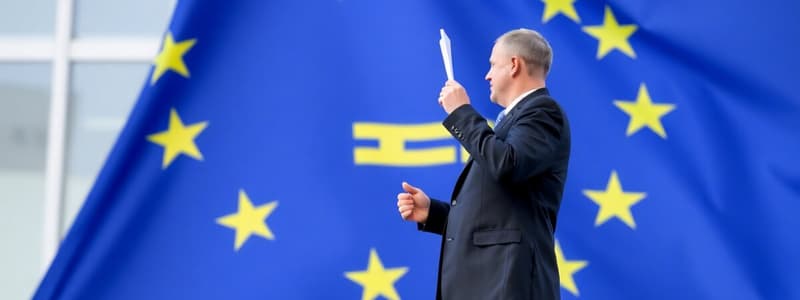Podcast
Questions and Answers
The Euro was introduced in ______
The Euro was introduced in ______
2002
The biggest enlargement of the EU occurred in ______
The biggest enlargement of the EU occurred in ______
2004
Euroscepticism began to emerge during the ______
Euroscepticism began to emerge during the ______
nineties
In 2005, the proposed European Constitution was rejected by ______ and France.
In 2005, the proposed European Constitution was rejected by ______ and France.
The rise of right-wing populist parties often focuses on ______ sovereignty.
The rise of right-wing populist parties often focuses on ______ sovereignty.
The rise of right-wing populist parties strengthened euroscepticism under the guise of protecting national ______.
The rise of right-wing populist parties strengthened euroscepticism under the guise of protecting national ______.
The original constitution became the Treaty of ______.
The original constitution became the Treaty of ______.
The EU has been criticized for having a lack of a common defense ______.
The EU has been criticized for having a lack of a common defense ______.
The EU's responses are often described as ______-driven, particularly evident during crises like COVID-19.
The EU's responses are often described as ______-driven, particularly evident during crises like COVID-19.
Countries within the EU want to maintain their ______ regarding migration policies.
Countries within the EU want to maintain their ______ regarding migration policies.
Despite the impact of Brexit, many countries are still interested in ______ the EU.
Despite the impact of Brexit, many countries are still interested in ______ the EU.
The European Commission can be compared to a ______ at the EU level.
The European Commission can be compared to a ______ at the EU level.
Only the European ______ has the right to submit legislative proposals.
Only the European ______ has the right to submit legislative proposals.
The European Council typically meets four times a year during the so-called ______.
The European Council typically meets four times a year during the so-called ______.
The European Council sets the strategic ______ and broad political directions of the EU.
The European Council sets the strategic ______ and broad political directions of the EU.
The European Council consists of the heads of state or government of the ______ EU member states.
The European Council consists of the heads of state or government of the ______ EU member states.
The permanent president of the European Council as of 2024 is ______ Michel.
The permanent president of the European Council as of 2024 is ______ Michel.
The European Council makes key decisions, but it cannot propose or pass ______.
The European Council makes key decisions, but it cannot propose or pass ______.
Members of the European Council are indirectly democratically elected as they are leaders of national ______.
Members of the European Council are indirectly democratically elected as they are leaders of national ______.
The President of the European Council does not have voting ______.
The President of the European Council does not have voting ______.
The European Council can convene more frequently in times of ______.
The European Council can convene more frequently in times of ______.
The Council of the EU represents the ______ of the member states.
The Council of the EU represents the ______ of the member states.
Together with the European Parliament, the Council forms the ______ branch of the EU.
Together with the European Parliament, the Council forms the ______ branch of the EU.
The Council of the EU negotiates and adopts laws together with the ______.
The Council of the EU negotiates and adopts laws together with the ______.
The presidency of the Council of the EU ______ every six months between the member states.
The presidency of the Council of the EU ______ every six months between the member states.
The Council holds significant power, as it can adopt and amend laws together with the ______.
The Council holds significant power, as it can adopt and amend laws together with the ______.
The Council of the EU is indirectly democratic, as the ministers are members of ______ that have been elected by their citizens.
The Council of the EU is indirectly democratic, as the ministers are members of ______ that have been elected by their citizens.
The Council also plays an important role in coordinating policies between member states, for example, on ______ policy.
The Council also plays an important role in coordinating policies between member states, for example, on ______ policy.
The European Parliament is the only EU institution ______ elected by the citizens of the member states.
The European Parliament is the only EU institution ______ elected by the citizens of the member states.
The European Parliament represents European ______.
The European Parliament represents European ______.
The European Parliament passes laws together with the Council of the ______.
The European Parliament passes laws together with the Council of the ______.
The European Parliament consists of 705 members known as ______.
The European Parliament consists of 705 members known as ______.
The current president of the European Parliament is ______ Metsola.
The current president of the European Parliament is ______ Metsola.
Federalism divides power between a central authority and individual ______.
Federalism divides power between a central authority and individual ______.
The EU has certain ______ that distinguish it from other types of governance.
The EU has certain ______ that distinguish it from other types of governance.
Unlike US states, countries in the EU can almost do everything that US ______ cannot.
Unlike US states, countries in the EU can almost do everything that US ______ cannot.
The European Parliament can hold the European ______ accountable.
The European Parliament can hold the European ______ accountable.
Study Notes
Introduction of the Euro
- The Euro was introduced in 2002, replacing the currencies of 12 of the 15 EU member states.
- This was a massive logistical undertaking involving billions of new bills and coins.
EU Expansion
- The EU experienced the largest expansion in its history between 2004 and 2013.
- 12 new Member States joined in 2004, followed by Bulgaria and Romania in 2007, and Croatia in 2013.
- The fall of the Berlin Wall sparked optimism and enthusiasm for EU expansion, leading to a belief in the possibility of bringing democracy and prosperity to new countries.
Euroscepticism
- The first signs of antipathy towards European unification appeared in the 1990s.
- This was fueled by the rise of right-wing populist parties, which focused on national sovereignty, xenophobia, and protectionism, attracting a significant portion of the electorate.
- The accession of 12 new Member States from Eastern Europe amplified the divide between the wealthier northwest and the poorer south and east, despite strict entry criteria.
- In 2005, the Netherlands and France rejected the proposed EU Constitution, boosting euroscepticism.
- Right-wing populist parties opposed further EU integration under the facade of protecting national sovereignty and economic protectionism.
- The EU Constitution was transformed into the Treaty of Lisbon, retaining most of the original measures but facing less opposition due to its alternative name.
Limitations of the EU
- Despite significant successes, like open borders and the single market, the EU still faces challenges.
- A common defense policy and a unified migration policy are lacking.
- The EU primarily reacts to crises, which is seen as a necessity by some experts, but others argue for more structural responses.
Double Standards Within the EU
- The EU has common policy areas, such as health, climate, culture, the single market, the Euro, and EU citizenship.
- However, it lacks uniformity in defense and migration policies.
- National governments maintain sovereignty over financial policy and migration.
- Populist parties oppose ceding sovereignty to Brussels.
Future of the EU
- Brexit served as a warning to countries considering leaving the EU.
- Although anti-EU parties exist in countries like Italy and Poland, Brexit has likely deterred further exits.
- The EU continues to attract new Member States.
European Commission
- The European Commission acts as the executive body of the EU, similar to a government.
- It represents the interests of the entire EU and manages the day-to-day operations of the EU and the implementation of EU policies.
- Its primary function is to propose legislation, making it crucial to the EU's legislative process.
European Council
- The European Council sets the strategic priorities and broad political directions of the EU.
- It determines the long-term vision of the EU in areas like economic strategy, foreign relations, and security policy.
- It is composed of heads of state or government from all EU member states, the President of the European Council, the President of the European Commission, and the High Representative for Foreign Affairs when external relations are discussed.
- It has a permanent president, currently Charles Michel, who chairs meetings and mediates between member states but does not possess voting rights.
- It has significant influence over strategic and political choices, such as granting new powers to the EU or expanding the EU with new member states.
Council of the European Union
- The Council of the European Union represents the national governments of the EU member states.
- It is known as the Council of Ministers and is a legislative body alongside the European Parliament.
- Along with the European Parliament, it establishes EU legislation and coordinates policies between member states, especially in areas like economic policy, security, justice, and foreign relations.
- It also represents the EU alongside the European Commission in international negotiations.
- Its membership consists of ministers from each member state, with the specific ministers present determined by the topic of discussion.
- It has no permanent president and rotates every six months between member states.
- It plays a crucial role in the EU's decision-making process, adopting and amending laws with the European Parliament.
- It also holds authority over foreign policy, security, and negotiating treaties with other countries or international organizations.
European Parliament
- The European Parliament is the only EU institution directly elected by citizens.
- It represents European citizens and plays a vital role in the EU's legislative process.
- It has three main functions:
- Passing laws with the Council of the EU, although it cannot propose laws.
- Approving the EU budget and overseeing spending.
- Supervising EU institutions, especially the European Commission, and holding it accountable.
- It is comprised of 705 members (MEPs) elected every five years by citizens in each EU member state, with the number of seats per country proportional to its population size.
- It has a president, currently Roberta Metsola, who chairs meetings and represents the Parliament externally.
- It holds significant power in lawmaking, sharing this responsibility with the Council of the EU. It can approve, amend, or reject laws, the EU budget, and holds the European Commission accountable.
- It has limited influence in areas like defense and taxation, as it cannot propose laws.
Federalism vs. Confederalism
- The EU is viewed as a state with independence, a defined territory, sovereignty, and legitimacy.
- Federalism divides power between a central authority and individual states or regions, granting both levels independent authority. Examples include the United States and Germany.
- The EU differs from the US model in that EU countries retain more power than states in the US, such as being able to make treaties.
Studying That Suits You
Use AI to generate personalized quizzes and flashcards to suit your learning preferences.
Related Documents
Description
Test your knowledge on the introduction of the Euro and the major expansion of the EU from 2004 to 2013. Explore the impact of Euroscepticism and the factors influencing member state accession. This quiz covers key events and themes in modern European Union history.



